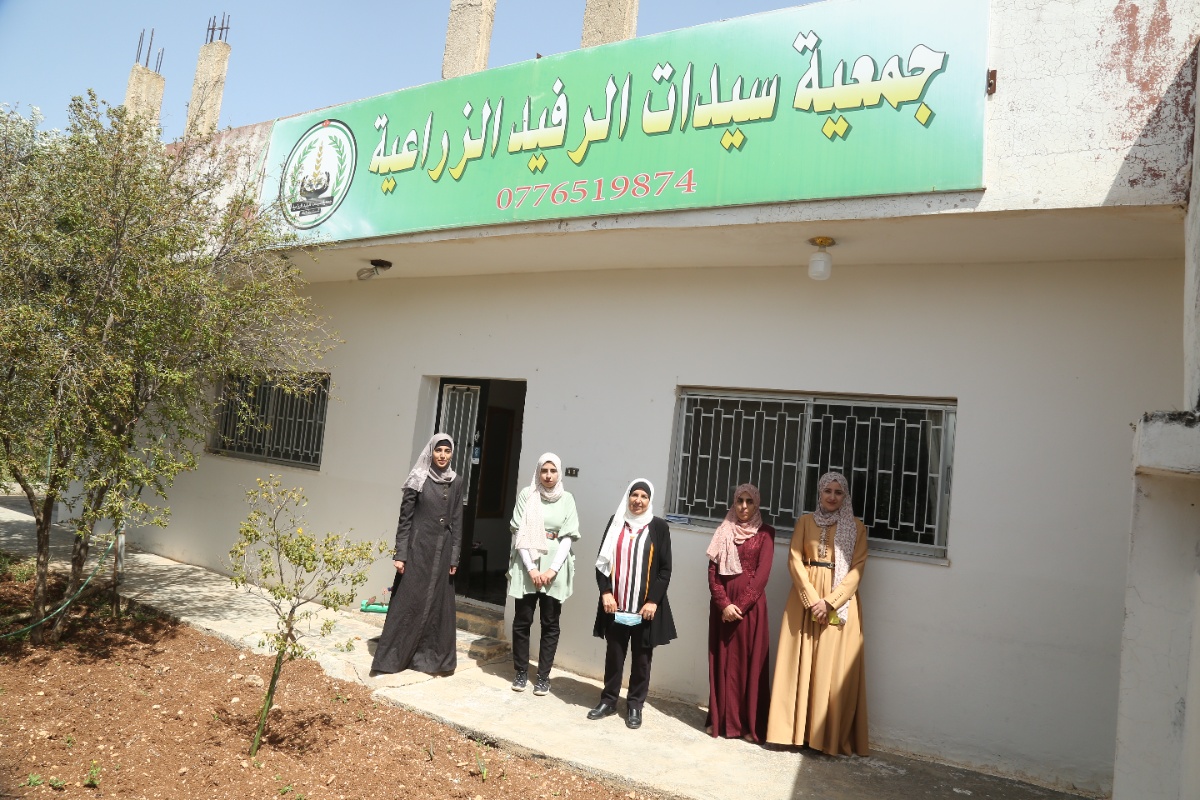By Eman Abu Qaou’d
President of the Al-Rafid Women’s Agricultural Society in Irbid Wedad Obeidat believes it is important to help young women get involved in social work, in which she has been engaged for the last 40 years. Her long involvement in the field earned her the title “Auntie” from the majority of young women workers
Obeidat has been active in social work since she was a child due to her father’s passion for serving his community. Her father is a “sheikh” and a mayor called “Basha”, [the mayor calls him basha, or is he also the mayor of … a town/village, and is called basha? The underlined is not clear, please fix as fit] a title used for influential and respected men, which he is, due to his contribution in serving the needy and solving people’s problems.
For Obeidat, it was only natural to volunteer at the village association, “Al-Rafid Society”, as soon as she turned 18; 42 years later, she became the president of the most prominent charity in her area.
How it all started
Speaking to Al Nahda Women Network, Obeidat says: “I was providing services to whoever requested them, and I was fully aware of the importance of community development. As a student at college, I never hesitated to volunteer with my classmates. I was the first in my class in Irbid, which helped me enrol in university and obtain a business management degree from Al-Yarmouk University.
“After graduation, I joined Al-Rafid health center. This is where it all started; the center was the perfect place to provide the services I wanted to provide for my people. My coworkers’ passion for voluntary work helped a lot, as did the support from my father and siblings.”
She proudly recalls the first event she held with the help of her coworkers. Measuring blood sugar levels for the people in the community was important; many people in the area were diabetic which made the possibility that many more were as well high. . Starting to run tests for other illnesses, Obeidat and her coworkers started a week-long “health camp” in the villagesupported by specialized entities. The area was remote and had few means of transportation leading to it, so they contacted the Ministry of Health, friends and family, pharmaceutical firms and health services providers for support. Variously specialized doctors joined the camp.
“I was very proud hearing people talk about Wedad Al-Basha’s service to her community.”
A continuous journey in social work
The support of her family helped her get over the challenge of overcoming the culture of shame easily. Her belief in women’s ability to do any job as long as they realize their capabilities and strengths also helped tremendously.
“I worked as the office manager of the health department manager and learned a lot about patients with thalassemia, a disease I had never heard of before. I researched it and decided to help families of children who have it and made them visit the hospital. We collected donations to buy a special device for treatment through several activities, including a marathon in Amman.”
She convinced families feeling ashamed of their family member’s illness to pursue treatment.
Al-Rafid Women’s Agricultural Society
After 16 years of work at the Ministry of Health, Wedad wanted to give more, which motivated her to establish Al-Rafid Women’s Agricultural Society seven years ago; the society has over 128 female members. At the beginning, “I wanted to register the society, and I was surprised by the employee’s response: ‘An agricultural society for women?’, and that only made me more adamant. I knew my area’s needs and I know its lands, plants and agriculture.”
“After registering the association, I clearly remember the hand-written sign we proudly hung over the door of our rented office. Local and international agricultural institutions started contacting us and we held our first-ever activity in collaboration with the “National Agricultural Research Center” about beekeeping. The training targeted 60 specialists, but 128 showed up.”
More training courses followed, and the association secured multiple projects pertaining to greenhouses, home gardens, recycling, loans, and pickles and jam production; over 100 home gardens were established in the area.
Community solidarity in the face of COVID-19
Equipped with faith in women’s role in social work, Obeidat launched various initiatives in her area during the COVID-19 pandemic, including the “A family with a baker never goes hungry” initiative. She secured flour for women, shared baking recipes on social media, provided raw materials for most of her area’s community and for the purpose, using ovens, stoves and even wood fire. Another initiative is “My home-grown food”, whereby home garden owners exchange produce and sell their crops.
According to Obeidat, who strongly believes women are able to work in any sector, but especially perform social work, the secret to women’s success is the organization of ideas and objectives, and planning. Her work has always been very well-organized, which led to her success. She also believes family support is instrumental in women’s success.
Al Nahda Women Network functions under the umbrella of the Arab Renaissance for Democracy and Development (ARDD) and strives to highlight women’s success stories in different areas and shed light on the challenges they face through a series of articles published on social media.
This story is part of a series of blogs under ‘For Us-by-Us Project’ implemented in cooperation with Heinrich-Böll Stiftung Palestine/Jordan Office


